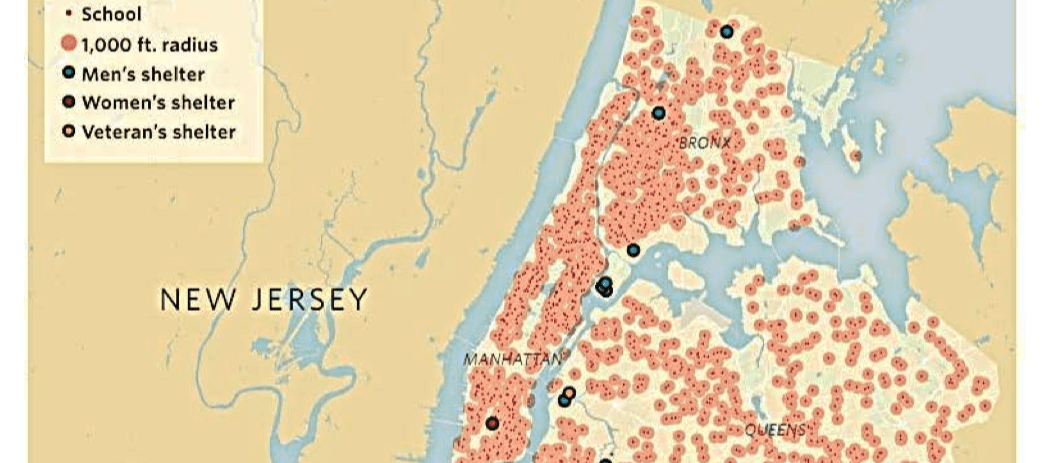NY Gov. Cuomo’s Terrible, Horrible, No Good, Very Bad Plan to Protect Your Kids
New York Governor Andrew Cuomo recently unveiled a legislative proposal packaged as part of a budget amendment to expand already onerous residency and presence restrictions for some sex offenders in New York. The proposal expands blanket presence and residency restrictions for sex offenders who are on parole or post-release supervision by vastly increasing the number of places they cannot be […]

New York Governor Andrew Cuomo recently unveiled a legislative proposal packaged as part of a budget amendment to expand already onerous residency and presence restrictions for some sex offenders in New York.
The proposal expands blanket presence and residency restrictions for sex offenders who are on parole or post-release supervision by vastly increasing the number of places they cannot be near. It would outlaw the presence of some sex offenders within 1,000 feet of school grounds, “any facility or institution that offers kindergarten or pre-kindergarten instruction,” or any other place that is “used for the care or treatment” of minors. The proposal also prohibits level 2 and 3 sex offenders — those whom the state deems most at risk to re-offend — from staying at homeless shelters that serve families, even if they are no longer under supervision.
In dense urban environments like New York City, such restrictions — which make it illegal for sex offenders to merely exist in many places — are tantamount to banishment. While sex offender registries (and many of the restrictions that go along with them) have proven to be ineffective and inhumane, public defenders, experts, and advocates say that few restrictions are as ineffective and punitive as those proposed by Cuomo.
“It’s hard to believe that we are debating banishment as an acceptable public safety measure in 2018,” Christina Swarns, attorney-in-charge of New York’s Office of the Appellate Defender, which provides appellate representation to individuals convicted of felonies, told The Appeal. “This conversation is particularly absurd given the overwhelming evidence that people convicted of sex offenses are more likely to re-offend when isolated and denied medical, social and economic supports. Banishment is a punishment that should remain in the dustbin of history.”
The theory behind the restrictions advanced by Cuomo is that by banishing people convicted of sex crimes from places where children are present, children will be safer. Proposals like Cuomo’s operate on the assumption that sexual offending is perpetrated by serial predators roaming the streets, but the data demonstrates that sex offenses far more commonly take place within the confines of families, relationships, schools, and workplaces — where victims know and trust their perpetrators. It is social proximity, not geographicproximity, that facilitates the majority of sex crimes.
While proponents of the Cuomo proposal suggest it targets those deemed most likely to re-offend, Lauren Stephens-Davidowitz, a supervising attorney with the Office of Appellate Defender, told The Appeal that the risk assessment tool used by New York State has never been subject to scientific scrutiny. For example, it treats a sex offender’s status as a juvenile as an aggravating (rather than mitigating) factor in assigning a risk level. So it’s unclear if the risk levels assigned by authorities, such as the Level 2 and 3 categories, are based on criteria that are scientifically sound.
Further, the research conducted on geographic restrictions like those proposed by Cuomo demonstrate that they do not succeed at their goal of increasing public safety by preventing sexual offenses. Worse than being merely ineffective, policies that force out people who are most in need of services and support, like those on the sex offender registry, actually make re-offense more likely. “The evidence is fairly clear that residence restrictions are not effective,” according to a 2015 Department of Justice research brief on sex offender management. “In fact, the research suggests that residence restrictions may actually increase offender risk by undermining offender stability and the ability of the offender to obtain housing, work, and family support. There is nothing to suggest this policy should be used at this time.”
In addition to pushing people out of their communities, they also prevent prisoners from being released back into them. Swarns of the Office of Appellate Defender told The Appeal that there are an unknown number of inmates who in custody past their serve-out dates because they cannot provide a residential address that complies with existing residency restrictions on sex offenders. In 2016, New York’s Legal Aid Society and several other organizations sued state and city officials for holding nearly 200 people past their maximum sentence since 2014. If Cuomo’s proposal is passed, it seems likely that this problem will only become worse.
Courts, however, are beginning to show an increased willingness to strike down such restrictions on sex offenders. In 2015, a unanimous Massachusetts Court of Appeals observed that “the days are long since past when whole communities of persons, such Native Americans and Japanese-Americans may be lawfully banished from our midst.” Also in 2015, the California Supreme Court overturned blanket residency restrictions applied to sex offenders, noting that they “greatly increased the incidence of homelessness” amongst people on the registry. In 2016, the federal Sixth Circuit Court of Appealsstruck down several aspects of Michigan’s sex offender registry and noted that it “consigns [the plaintiffs] to years, if not a lifetime, of existence on the margins, not only of society, but often, as the record in this case makes painfully evident, from their own families, with whom, due to school zone restrictions, they may not even live.”
Despite court rulings, scientific research, and even an admonition from the Department of Justice, geographic restrictions on sex offenders continue to be supported by politicians like Cuomo and New York State Senator Jeffrey Klein. Advocates, policy experts, and public defenders say that these policies are not based in fact or science and place not in my backyard politics over public safety.
